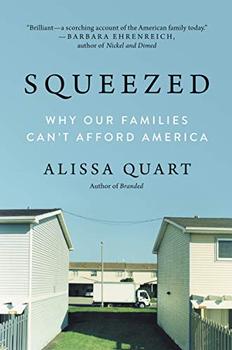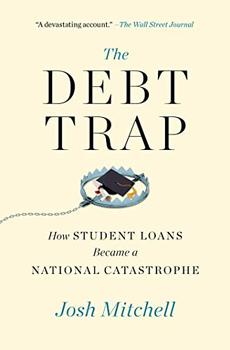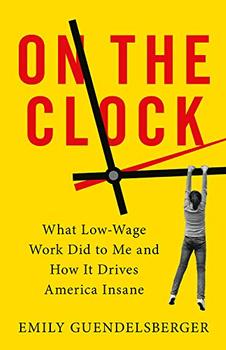Summary | Excerpt | Reading Guide | Reviews | Beyond the book | Read-Alikes | Genres & Themes | Author Bio

Why Our Families Can't Afford America
by Alissa QuartAt thirty-five, Brianne Bolin, an adjunct professor at Columbia College with a Ph.D in English, never dreamed she'd be shopping for clothes at Goodwill or relying on food stamps and Medicaid to support her eight-year-old son, Finn, who has paraplegic cerebral palsy. But she, like a lot of people Alissa Quart chronicles in Squeezed: Why Our Families Can't Afford America, is a perfect example of what Quart calls the Middle Precariat, "extensively trained and educated workers" who are saddled with "debt, overwork, isolation, and shame about [their] lack of money."
Quart backs up this reading with statistics. Compared to twenty years ago, contemporary middle-class life has become thirty percent more expensive and college has almost doubled in cost. Daycare eats almost thirty percent of one half the earnings of a two-salary household. And while the middle class is feeling the squeeze, working class people of color and immigrants, unable to obtain affordable housing, education and well-paying jobs, are being frozen out completely.
Behind these sobering facts are stories of people caught in an endless plunge from the economic ladder. Quart exhaustively investigates their plight, combing through Silicon Valley's shadow economy, where teachers and journalists moonlight as Uber drivers or strip-club bouncers; sitting in on classes for downsized middle-aged workers as they retrain for a younger and lower-paid job market; and chronicling Blanca, an overworked and underpaid Paraguayan nanny, and her near-Herculean efforts to get her son into a decent school in New York City's convoluted public school system.
While the struggle hits both genders, it is women who fare worse. As the aforementioned Blanca attests, they often work in fields–domestic and childcare work, nursing, teaching–that are increasingly undervalued and underpaid. One of seven child-care workers, many of whom are women of color and immigrants, live below the poverty line. Nurses face the threat of automation. Pregnancy discrimination has risen twenty-three percent from 2005 and 2011. And when former black journalist Courtenay Edelhart looks for more lucrative work in public relations, she encounters the triple hardships of race, gender, and age. Men who work in traditionally feminized jobs, like Uber-driving teacher Matt Barry, are also boxed out. Stripped of their earning power, women, particularly women of color, and their families are the biggest economic losers.
Despite the bleak outlook, there are solutions. Quart gives much needed attention to issues like universal basic income (see Beyond the Book), which would provide a basic income to all citizens regardless of employment, universal public Pre-K childcare programs for working families, like the one championed by New York Mayor Bill de Blasio, and generous parental paid leave laws.
Most of the problems Quart addresses are deeply systemic and require social and political movements to resolve, something she could have addressed more since they are the result of long-stemming political choices. Still, Squeezed has much in common with works like Barbara Ehrenreich's Nickel and Dimed
about minimum-wage workers, for her sympathetic portraits of people deeply affected by these issues and that makes it more than an important work for people concerned about economic inequality.
Quart, who admits to dealing with some of the same insecurities, empathizes with people who blame themselves for the challenges they face in a system that is rigged against them. More than just a scathing moral indictment of a country that pays lip service to the interests of working families, Squeezed is also a compassionate argument for creating an economy that prioritizes people over profits.
![]() This review was originally published in The BookBrowse Review in August 2018, and has been updated for the
May 2019 edition.
Click here to go to this issue.
This review was originally published in The BookBrowse Review in August 2018, and has been updated for the
May 2019 edition.
Click here to go to this issue.

If you liked Squeezed, try these:

by Josh Mitchell
Published 2022
From acclaimed Wall Street Journal reporter Josh Mitchell, the dramatic, untold story of student debt in America.

by Emily Guendelsberger
Published 2020
The bitingly funny, eye-opening story of a college-educated young professional who finds work in the automated and time-starved world of hourly labor.
Your guide toexceptional books
BookBrowse seeks out and recommends the best in contemporary fiction and nonfiction—books that not only engage and entertain but also deepen our understanding of ourselves and the world around us.